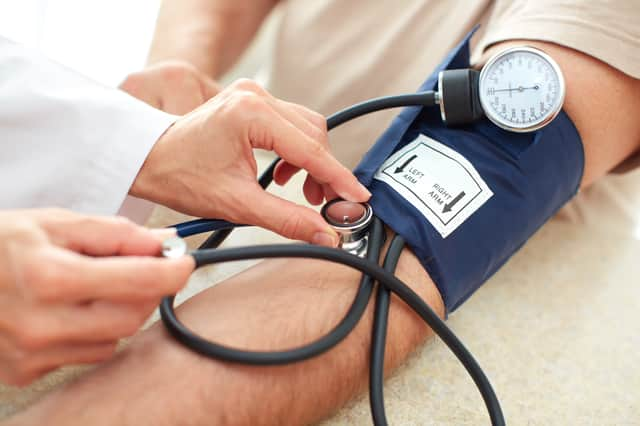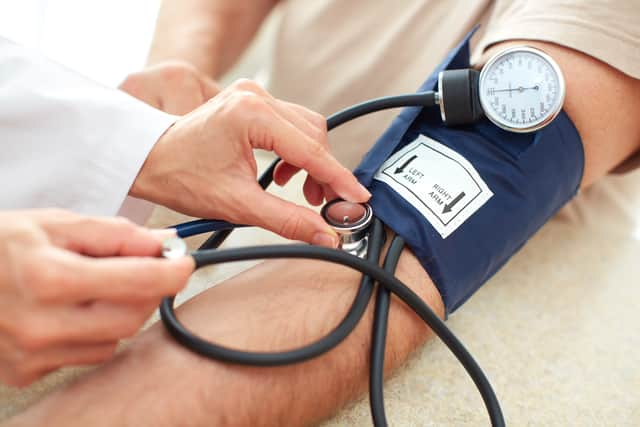High blood pressure injection: six-monthly jab could soon replace daily pills - what are the symptoms?


High blood pressure could soon be treated with an injection every six months instead of a daily tablet if a new study proves successful.
Scientists are testing the approach in what they say is a world first in how hypertension (high blood pressure) could be treated.


Who will take part in the trial?
Advertisement
Hide AdAdvertisement
Hide AdAround 100 patients across the UK will be part of the 630 patients worldwide involved in the new research by Queen Mary University of London (QMUL) and Barts Health NHS Trust.
People who are diagnosed with high blood pressure typically take tablets once a day to control the condition, researchers said.
Dr Manish Saxena, study lead and deputy clinical director at QMUL, said: “It is early days but our ultimate hope is that the treatment proves to be a safe and more manageable, practical solution to tackling high blood pressure.
“A twice-yearly treatment with injection underneath the skin would provide a better alternative to taking daily medication, which we believe would be welcome news for patients and make treating hypertension more convenient.”
Advertisement
Hide AdAdvertisement
Hide AdThe study, funded by Alnylam Pharmaceuticals and supported by the National Institute for Health and Care Research (NIHR), is due to run for three years.
The British Heart Foundation (BHF) said while there is not always an explanation for the cause of high blood pressure, most people develop it because of their diet, lifestyle or a medical condition.
Professor Sir Nilesh Samani, medical director at the BHF, added: “This exciting trial could lead to good news for the millions of people across the UK with high blood pressure, many of whom need to take daily medication to lower their risk of heart attacks and strokes.
“The study will determine whether an injection given twice a year lowers blood pressure sufficiently over a prolonged period. If this proves to be the case, it may provide an alternative to taking daily pills for some patients.”
What is high blood pressure?
Advertisement
Hide AdAdvertisement
Hide AdBlood pressure is recorded with two numbers; the systolic pressure (higher number) is the force at which your heart pumps blood around your body, and the diastolic pressure (lower number) is the resistance to the blood flow in the blood vessels.
The NHS says as a general guide high blood pressure is considered to be 140/90mmHg or higher (or 150/90mmHg or higher if you are over the age of 80). Ideal blood pressure is considered to be between 90/60mmHg and 120/80mmHg.
If you have a blood pressure reading between 120/80mmHg and 140/90mmHg it could mean you are at risk of developing high blood pressure if steps are not taken to bring it under control.
It should be noted that everyone’s blood pressure will be slightly different and what is considered low or high for one person may be normal for someone else.
Advertisement
Hide AdAdvertisement
Hide AdTo check if you have high blood pressure you will need to have a test, which can be done at your GP surgery, some pharmacies, as part of your NHS Health Check, or in some workplaces.
All adults over the age of 40 are advised to have their blood pressure checked at least every five years.
What are the symptoms?
Around a third of UK adults have high blood pressure but many might not know it, according to the NHS.
It often does not have noticeable symptoms, but if hypertension is not treated it can increase the risk of heart attacks and strokes.
Key symptoms to look for include:
- blurred vision
- nosebleeds
- shortness of breath
- chest pain
- dizziness
- headaches
Advertisement
Hide AdAdvertisement
Hide AdSome lifestyle changes can help to prevent and lower high blood pressure, including reducing your salt, caffeine and alcohol intake, losing weight if you are overweight, exercising regularly, and stopping smoking.
Comment Guidelines
National World encourages reader discussion on our stories. User feedback, insights and back-and-forth exchanges add a rich layer of context to reporting. Please review our Community Guidelines before commenting.
